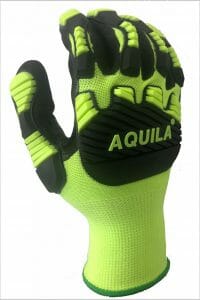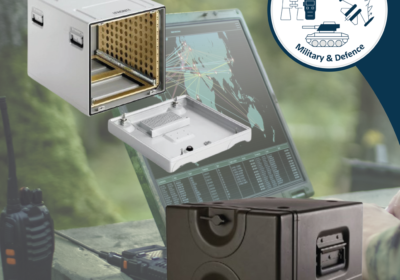Market leading glove manufacturer Aquila have long recognised that injuries caused to hands are not confined to the palm of the hand or fingers, but also the back of the hands where hazards can lead to painful injuries with time lost from work – which is expensive for both workers and employers. This has led to their focus on Impact Protection gloves as an integral part of an all-round hand protection strategy.
In gloves, along with comfort goes performance – the ability to absorb impacts and prevent injuries to the fingers/back of hand is inextricably linked to other factors such as providing a suitable grip on the palm/finger area This means that it is important to carefully match the glove to the specific tasks together with other requirements such as back of the hand protection, wrist security and good grip in oil, mud or other fluids.

Contrary to what we see in some cheap products impact protection is not just a matter of sticking a piece of plastic or rubber on the fingers and back of hand. The whole point of industrial gloves is to protect the user’s hands while enabling them to operate with as little difficulty as possible. In the case of impact protection gloves, this means not only protecting against blows, nips, abrasions etc., but to do so with the greatest comfort and least interference plus having enhanced grip over the bare hand. Such gloves should not be tiring to wear as not only is this undesirable in itself, but tired operators with tired hands are more likely to make errors and have accidents.
Consequently, Aquila are delighted to be in the forefront of development of superior impact protection to ensure the best in glove safety and comfort/usability at a sustainable cost. For the welfare of workers, glove comfort is key for two reasons – for example we find that soft gloves are less tiring to wear so minimising errors caused by fatigue – reducing injuries. Similarly, we find that with all gloves it is vital that they are easily to put-on/take-off and comfortable to wear – otherwise they simply will not be worn or will lead to injury by virtue of reducing the operator’s ability to properly handle the equipment – soft gloves are also easier to remove in the event of injury.
So in development of high performance impact gloves Aquila have considered many materials and types at different prices, and chose impact pads mainly made of TPE (thermalplastic elastomer) otherwise known as TPR (thermalplastic rubber) after finding that this material greatly aids wearability and enhances dexterity, so ensuring that users keep their gloves on and keep working longer, better and safer.
TPE/TRP is excellent for impact protection but is expensive compared to much cheaper and lower performing PVC as used in extreme low-cost items where the result is some 20-30% cheaper to make, but the trade-offs are that PVC rapidly age hardens leading to hard, brittle protection, increased hand fatigue, less flexibility and sometimes resulting in injury after long hours of wearing. Aquila also found an important question is about how the impact protection is adhered to the gloves since it depends on the materials, for example sewn on pads may appear good and secure but they will come off easily if the material of the pad is brittle, allowing the pad to break off very easily – a situation aggravated if the gloves are laundered with the PVC being degraded in the process.
When looking at the many widely varying applications to be found in industries such as Oil and gas, Utilities, Mining, Vehicles, or Materials handling we see that over and above the specific impact resistance, gloves are usually required to offer more complex characteristics in combination e.g. Impact resistance with:
- Cut resistance
- High visibility colouration
- Wrist protection
- Secure retention
- High grip finger/palm area, e.g. coated with sand nitrile
- Thermally insulated
Aquila have some eleven definitive types of multi-functional impact gloves – taking just two examples with CE Certification to EN420/en388 we may look at the TOG6W range – an exciting development in the Aquila® Oil and Gas TPR glove range, which offers cushioned silicone protection shielding against blunt force impacts, with an unusually high degree of comfort down to -50°C. It is ideal for use in the Oil and Gas industry, also in cold or refrigerated stores and warehouses and for outdoor work in cold environments.
A secure grip on heavy equipment in wet and dry conditions, such as in oil and chemical production, is greatly aided by the sand impregnated nitrile coating which extends over the whole palm and finger gripping surface. Other features include high visibility colour to ensure that it may be seen and avoided by other workers in the area, also an opening cuff with Velcro closure for speed of fitting/removal, e.g. quick removal in an emergency and for security in use.
Meanwhile the Aquila TOG4B/G in either blue or grey is a TPR impact resistant glove with cut 4 level (ISO13997 level E) protection developed for high performance hand protection in the Oil and Gas industries. It is also of great value as Personal Protection Equipment (PPE) for the utility and mining industries where it delivers cut protection throughout the glove – i.e. the whole hand/finger/cuff, by virtue of its advanced Alkimos® yarn technology.
TPR pads in soft silicone again provide excellent protection to the backs of both hand and fingers while maintaining the high level of flexibility and dexterity for which Aquila® gloves are well known – whereas on the palms sand embedded nitrile is used to coat the whole palm/finger/gripping area for a secure hold on heavy equipment, even under wet conditions. Velcro closed cuffs also aid security/emergency removal.
Further information regarding Aquila® products may be found at: www.aquilaglove.com or follow them on twitter: www.twitter.com/@aquilaglove. Aquila® and Alkimos® are registered brands owned and developed by Taste International Ltd.





